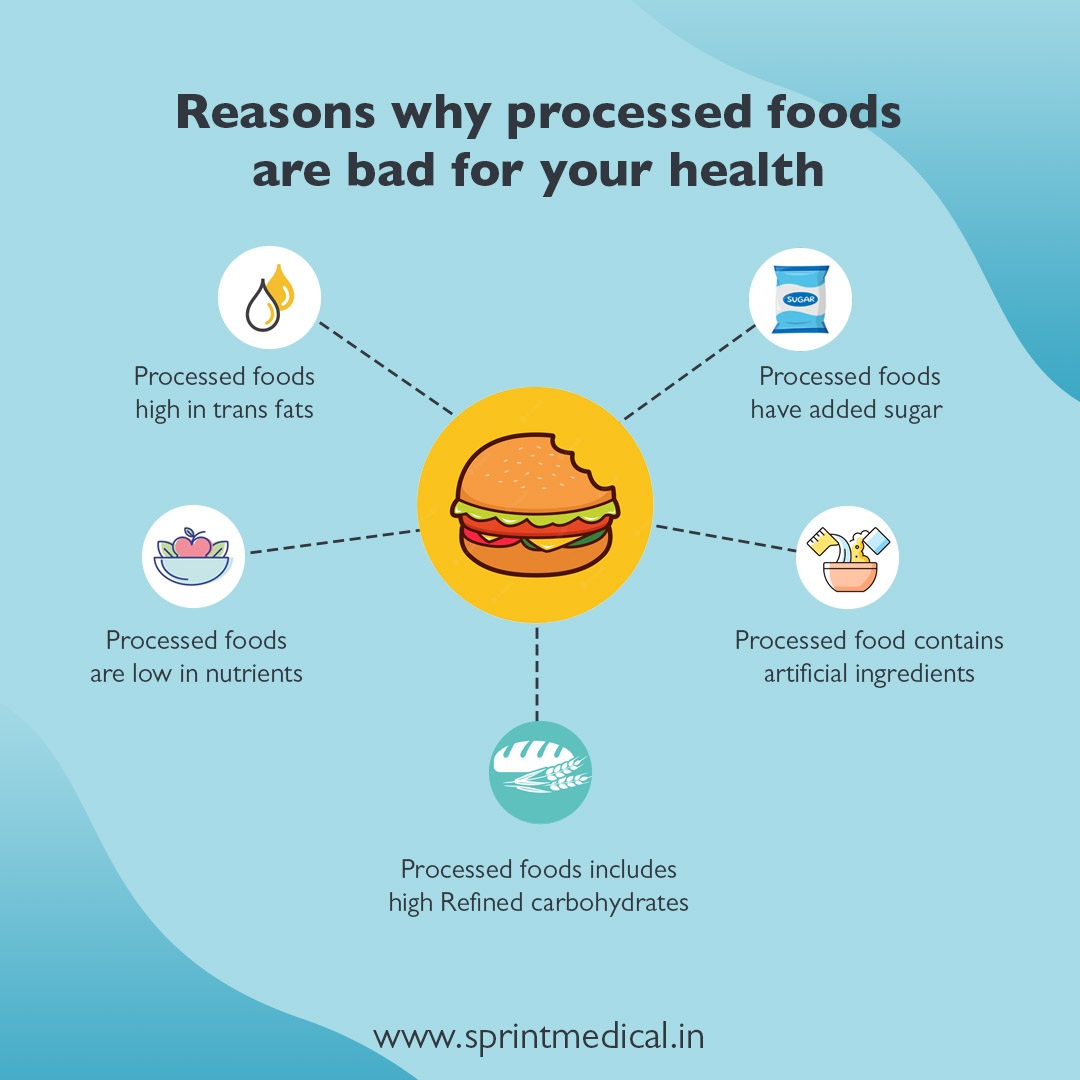Reasons why processed foods are bad for your health
Reasons why processed foods are bad for your health
The question arises, if bad, then why? What is it in processed food that is making it bad for your health? Here is a list of a few major reasons why processed foods are bad for you.

1. Processed foods have added sugar
In addition to high fructose corn syrup, processed foods frequently have extra sugar. Despite being high in calories, added sugar lacks any necessary nutritional elements. Compulsive overeating may result from regularly consuming too much added sugar. Inflammatory illnesses, type 2 diabetes, and obesity are just a few of the health issues it is connected to.
The majority of the added sugar in the diet comes from processed foods and drinks. The use of sugar in soft drinks tends to be far higher than consumers realize, making sweetened beverages a particularly major source.
It's simple and effective to change the diet to be healthier by reducing added sugar intake, such as by switching to sparkling water from soda.
3. Processed Foods Contains Artificial Ingredients
Ingredients listed on the back of processed food packaging frequently contain a lot of strange compounds. Some of these are synthetic compounds that the manufacturer adds to the meal to improve its flavor.Artificial ingredients of the following sorts are frequently found in highly processed foods:
Artificial coloring
Chemical flavoring
Texturing additives
Preservatives, which prevent food from spoiling quickly
Additionally, dozens of other chemicals may be present in processed foods that are not disclosed on their labels.
An example of a proprietary blend is "artificial flavor." It usually refers to a combination of compounds, but manufacturers are not required to explain exactly what that means.Although the majority of food additives have undergone official safety testing, doctors and researchers still have reservations about the usage of these substances.
4. Processed foods includes high Refined carbohydrates
Any diet must contain carbohydrates as a necessary ingredient. However, whole food carbohydrates are better for your health than refined carbohydrates. Refined or simple carbohydrates are readily broken down by the body, causing a surge in blood sugar and insulin levels. When these levels subsequently decline, a person could feel lethargic and have cravings for food.
Consuming refined carbohydrates is associated with a higher risk of type 2 diabetes because they frequently increase and drop blood sugar levels.Foods with a lot of processing often include a lot of refined carbs.
Carbohydrates from healthy sources include:
whole grains
vegetables
fruits
beans and pulses
5. Processed foods are low in nutrients
When compared to whole or minimally processed foods, processed foods have very low concentrations of vital elements. Manufacturers occasionally add synthetic vitamins and minerals to products to make up for nutrients lost during manufacturing. However, compared to processed diets, whole foods offer additional beneficial ingredients.
For instance, fruits, vegetables, and grains contain beneficial plant components that have anti-inflammatory, antioxidant, and anticarcinogenic properties. These include carotenoids, tannins, anthocyanins, and flavonoids. Eating whole, minimally processed meals is the greatest approach to consume all of the vital nutrients.
6. Processed foods high in trans fats
Foods that have undergone extreme processing frequently include large amounts of unhealthy, cheap fats. As an example, they frequently include refined vegetable or seed oils, which are affordable, and long-lasting. By adding hydrogen and turning liquid vegetable oils into solids, manufacturers produce artificial trans fats.
Body inflammation is exacerbated by trans fats. Additionally, they cause a decline in "good" cholesterol and an increase in "bad" cholesterol or low-density lipoprotein (LDL).
Consuming trans fats is linked to a higher risk of type 2 diabetes, heart disease, and stroke. For instance, a 2019 study found that a 2% increase in trans fat intake was associated with a 23% increase in cardiovascular risk.
Avoiding processed meals is the greatest approach to prevent trans fats and refined oils. These can be swapped out with healthier options like coconut oil or olive oil.
Comments
Post a Comment